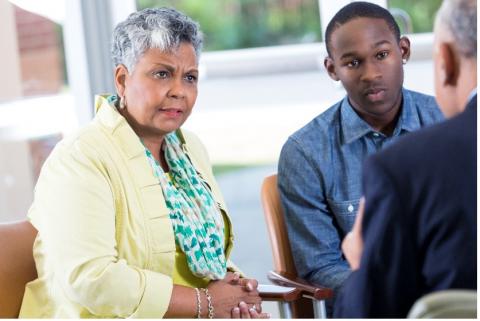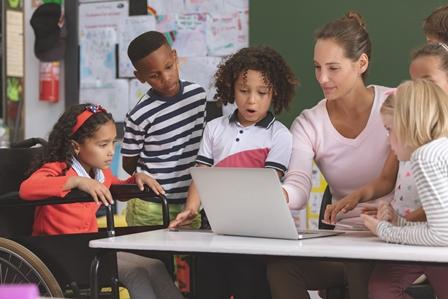CADRE has compiled resources geared toward assisting states, parent centers, practitioners, and families who are interested in equity initiatives and developing or improving cultural competency in their own practice or within their professional environments.
Family Stories
Taking time to listen to the lived experiences of culturally and linguistically diverse families and the barriers they face accessing and participating in dispute resolution is critical. Awareness and understanding of individual experiences leads to more equitable dispute resolution systems and practices. The following resources offer potential insight into family perspectives.

- Getting the Family Involved – Engaging in Education in Native Communities, Presented by: Priscilla Maynor. Ed.D, Lumbee Tribe of North Carolina
- Visiting a House on the Other Side of Town , Presented by: Johnny Lake, Ph.D., Assistant Professor, Northwest Christian College
- Shifting Your Perspective: Lessons and Insights from Spanish-Speaking Families, National Center on Deaf-Blindness
- La Sopa de la Abuela: Special Education Telenovela, Arlington Public Schools
Knowledge and Skills
Anyone interested in improving their interactions and relationships with culturally and linguistically diverse individuals and communities will benefit from ongoing knowledge and skill development. Having the knowledge and skills necessary to respond in more culturally and linguistically appropriate ways improves access and participation in dispute resolution processes. The following resources provide content for continued growth and development.

- Beyond the Dotted Line: Empowering Parents From Culturally and Linguistically Diverse Families to Participate, Ya-Chih Chang, Mariela Avila, and Hannah Rodriguez, Teaching Exceptional Children
- Exploring the Cultural Dimensions of Conflict, Presented by: Sukhsimranjit Singh, Associate Director, Willamette University Center for Dispute Resolution
- Promoting Equity in Education Through Family Engagement, Formed Families Forward
- VIDEO: Parent Engagement in the Early Years, Part I (link is external), Presented by: Dr. Marilyn Chipman, Equity Specialist Coordinator, The Region III Equity Assistance Center
- VIDEO: Parent Engagement in the Early Years, Part II (link is external), Presented by: Dr. Marilyn Chipman, Equity Specialist Coordinator, The Region III Equity Assistance Center
- https://www.multiculturalfamilies.org/resources/professional-webinars/
- Responding Racial Bias and Microaggressions in Online Environments, CORA Learning
- Disproportionality in Special Education | IDEA Part B | Module 5, Center for Parent Information and Resources (CPIR)
- Race and Ethnic Background in Special Education, Exceptional Children's Assistance Center
- Leading by Convening: A Blueprint for Authentic Engagement
- Cultural Competence Key Concepts and Terms: What they mean for the New Jersey Council on Developmental Disabilities, Georgetown University National Center for Cultural Competence
- Linguistic Competence: What it means for The New Jersey Council on Developmental Disabilities, Georgetown University National Center for Cultural Competence
- Improving en loco parentis: Engaging families and communities in culturally responsive ways, CEEDAR Center
Language Access
When information is communicated in plain language, in the spoken language of the families served, and in accessible formats, families can make informed decisions, and barriers to access and participation in dispute resolution processes are reduced. The following resources provide strategies for improving language access.

- Working Together with Interpreters, Open Doors for Multicultural Families
- How Language Can Impact Accessibility and Inclusion, RAISE Center
System Improvement
Culturally and linguistically competent dispute resolution systems are aware of barriers, biases, and disparities existing within their system which lead to inequitable outcomes for users. They prioritize engaging with their stakeholders from diverse communities, challenging norms and assumptions, and embracing new ways of functioning to create more equitable and accessible systems. The following resources provide content to assist with cultural and linguistic system improvement efforts.

- Gain a Better Understanding of Your Dispute Resolution System Utilizing CADRE’s CLC Self-assessment Process, Webinar introducing key components of CADRE's CLC Self-assessment Tool, and how it can lead to system improvement.
- Getting Buy In and Implementing Cultural and Linguistic Competence Organizational Assessments, Presented by: Andy Arias, Policy Advisor U.S. Department of Labor, Tawara D. Goode, Principal Investigator Leadership Institute for Cultural Diversity and Cultural and Linguistic Competence Georgetown University National Center for Cultural Competence Director, Vivian Jackson, Senior Policy Associate Leadership Institute for Cultural Diversity and Cultural and Linguistic Competence Georgetown University National Center for Cultural Competence Elizabeth Weintraub, Advocacy Specialist Association of University Centers on Disability
- Cultural Competence: What it Means for Person-Centered Thinking, Planning, & Practice, Presented by: Georgetown University National Center for Cultural Competence and the National Center on Advancing Person-Centered Practices and Systems (NCAPPS)
- Pieces of the Same Puzzle: The Role of Culture in Person-Centered Thinking, Planning, and Practice, Tawara D. Goode: July 9, 2019 - PowerPoint; Recording; Spanish Language Transcript
- Community-Led Systems Change in a Public School District through Parent Participatory Evaluation, Presented by Amanda Dionne and Maren Gelle Henderson, Minneapolis Public Schools
- Pursuing Equity at the Intersection of Language, Culture, and Disability Thought Leader Conversation (TLC) Series, NCSI
- The Corner CAFE Podcast: NAFSCE, Learn about NAFSCE's Family Engagement Core Competencies, best practices for engaging families, emerging trends in Family Engagement, and more on this episode of The Corner CAFE Podcast.
Office of Civil Rights: School Climate and Safety Report
OSEP Fast Facts Summarizes key facts related to specific aspects of the data collection authorized by Section 618 of the IDEA. Data presented includes that collected through child count, educational environments and settings, discipline and exiting data collections.
The Cultural and Linguistic Competence Assessment for Disability Organizations (CLCADO)
Wisconsin's Equity Decision and Policy Tool (2019)
Native Land Acknowledgment: The Why and How for Parent Centers
Advocating for LGBTQ Students with Disabilities (2020)
Education in a Pandemic: The Disparate Impacts of COVID-19 on America’s Students (2021)
Restorative Practices: A Guide for Educators
Strategies for Equitable Family Engagement (2018)
Disability Language Style Guide
The Importance of Using Plain Language (PEATC)
Improving DR Practices for Diverse Families - ABA Magazine Article (2022)

